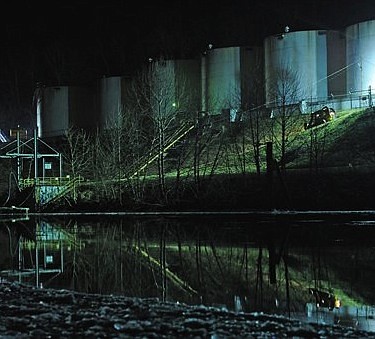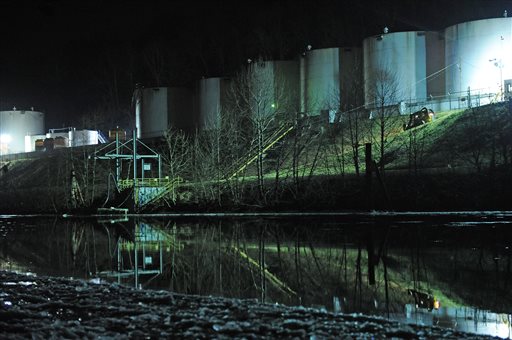CHARLESTON, W.Va. - Several hundred thousand people in West Virginia remained without clean tap water for a third day Saturday following a chemical spill and a water company executive said it could be days before uncontaminated water is flowing again.
Water sample test results must consistently show that the chemical's presence in the public water system is at or below 1 parts per million, the level recommended by federal agencies, before residents can turn on their taps again, West Virginia American Water President Jeff McIntyre said Saturday at a news conference.
The company told residents in nine counties to not drink their tap water or use it to bathe or wash dishes or clothes after a foaming agent used in coal processing escaped from a Freedom Industries plant in Charleston and seeped into the Elk River. The only allowed use of the water was for flushing toilets. The order applies to about 300,000 people.
Thirty-two people sought treatment at area hospitals for symptoms like nausea and vomiting. Of those, four people were admitted to the Charleston Area Medical Center. Their conditions were not immediately known, Allison Adler of the Department of Health and Human Resources said Saturday.
Federal authorities, including the U.S. Chemical Safety Board, opened an investigation into Thursday's spill. The Chemical Safety Board said Saturday that its investigative team is scheduled to arrive in West Virginia on Monday.
"This incident continues to impact the people of West Virginia -- our goal is to find out what happened to allow a leak of such magnitude to occur and to ensure that the proper safeguards are in place to prevent a similar incident from occurring," Chemical Safety Board chairman Rafael Moure-Eraso said in a news release.
About 7,500 gallons of the chemical escaped from a storage tank and a containment area, said Michael Dorsey, chief of the state Department of Environmental Protection's Homeland Security and Emergency Response office.
Just how much of the chemical leaked into the river was not yet known. But Dorsey said during the news conference that state officials do not believe waterways downstream, including the Kanawha and Ohio rivers, will be affected because of dilution.
On Friday, the company's president issued an apology to West Virginia residents.
"We'd like to start by sincerely apologizing to the people in the affected counties of West Virginia," company President Gary Southern said. "Our friends and our neighbors, this incident is extremely unfortunate, unanticipated and we are very, very sorry for the disruptions to everybody's daily life this incident has caused."
Some residents, including John Bonham of Cross Lanes, were willing to accept Southern's apology.
"Yeah, I understand that stuff can happen," said Bonham, who also works in the chemical industry. "I don't think it's going to get him out of legal liability. OSHA is the one they're going to have to answer to."
The leak was discovered Thursday morning from the bottom of the tank. Southern said the company worked all day and through the night to remove the chemical from the site and take it elsewhere.
"We have mitigated the risk, we believe, in terms of further material leaving this facility," Southern said. He said the company didn't know how much had leaked.
The tank that leaked holds at least 40,000 gallons, said state Department of Environmental Protection spokesman Tom Aluise, although officials believe no more than 5,000 gallons leaked from the tank. Some of that was contained before escaping into the river, Aluise said.
Freedom Industries was ordered Friday night to remove chemicals from its remaining above-ground tanks, Aluise added.
The company was already cited for causing air pollution stemming from the odor first reported Thursday, Aluise said.
The primary component in the foaming agent that leaked is the chemical 4-methylcyclohexane methanol. The spill has forced businesses, restaurants and schools to shut down and forced the Legislature to cancel its business.
Health officials in Kanawha and Putnam counties were working to reopen restaurants, daycare centers and other facilities closed by the spill. Several facilities were inspected on Saturday after health officials approved their plans to provide water for drinking, cooking and other activities.
"We will work around the clock, 24-7, and try to open ... as many businesses as possible in the next couple of days," said Dr. Rahul Gupta, health officer for the Kanawha-Charleston and Putnam County boards of health.
Gov. Earl Ray Tomblin said the Federal Emergency Management Agency and several companies were sending bottled water and other supplies for residents.
By Saturday morning, FEMA said it had delivered about 50 truckloads of water, or a million liters, to West Virginia.
The water was being distributed to residents at volunteer fire departments, community centers and other sites. No problems were reported at the sites, county emergency officials said.
"Everybody's been pretty patient with us," Greg Lay, Boone County emergency services director, said Saturday.
"Like most things that happen, we're into it enough now that everybody's ready for it to be over," he said.
At a Kroger near a DuPont plant along the Kanawha River, customers learned the grocery store had been out since early Friday.
Robert Stiver was unable to find water at that and at least a dozen other stores in the area and worried about how he'd make sure his cats had drinkable water.
"I'm lucky. I can get out and look for water. But what about the elderly? They can't get out. They need someone to help them," he said.
The spill, occurring during flu season, has raised concerns that cases could increase because residents can't use tap water to wash their hands, Gupta said.

